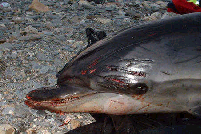EUROPEAN CETACEAN BYCATCH CAMPAIGN
"Man is but a strand in the complex web of life"
"Man is but a strand in the complex web of life"
Bycatch kills rare dolphin
Cornwall Wildlife Trust
18th October 2005
Cornwall Wildlife Trust attended another fatality on 14th October caused by entanglement in fishing gear, but this time the dolphin was a species rarely seen around Cornwall. Volunteers were called out to the scene at Porth Meor beach near Porthcothan and soon realised that this was not a common dolphin but a rare striped dolphin.
The striped dolphin is a small, slender animal normally occurring in groups of hundreds or thousands. They are very sociable animals but very rarely do we see them in UK waters.
The dolphin was taken to post-
Joana Doyle, Marine Conservation Officer for Cornwall Wildlife Trust said, “The striped dolphin that washed up dead was too young to have had the chance to breed before she died. Her struggle for survival must have been long and excruciatingly painful judging by the markings on her small body. This one dolphin should be a message to everybody, including the decision makers, that something has to be done to stop these deaths and to reform the fisheries here in the UK and at the European level.
By recording stranded cetaceans over the last 12 years, Cornwall Wildlife Trust and its dedicated team of volunteers have worked tirelessly to show the link between certain fishing methods and dead stranded cetaceans.
Last year there were 223 dead cetaceans recorded on Cornwall’s beaches. Joana Doyle said, “It has been estimated that only 5-
Since January this year, 77 dead cetaceans (dolphins, whales and porpoises) have already been reported to the Trust and the peak fishing season has yet to begin.
The UK government is very aware of the problem and is under obligation to take action. Pair-
Joana Doyle said, “This ban is not enough and will probably mask the problem, as the dolphins that are killed further out to sea now, will be less likely to wash ashore and be recorded. The precautionary principle should be adopted by the European Commission and pair-
The Cornwall Wildlife Trust is asking for support for its campaign to end these needless deaths by:
1. Reporting dead cetaceans to the Cornwall Wildlife Trust Strandings Hotline: 0845 201 2626.
2. Writing to your MP, urging him/her to fight for better regulation of our inshore fisheries through the Marine Bill.
3. Writing to Dr. Joe Borg, EU fisheries Minister asking him to put an end to cetacean bycatch in pair-
4. Avoid eating sea bass caught in pair-
For more information on Cornwall Wildlife Trust, visit www.cornwallwildlifetrust.org.uk
or contact the Trust on 01872 273939
Top
Striped dolphin
Photograph by Dave Jarvis
Photograph by Dave Jarvis
